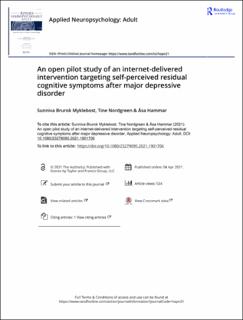An open pilot study of an internet-delivered intervention targeting self-perceived residual cognitive symptoms after major depressive disorder
Journal article, Peer reviewed
Published version

Åpne
Permanent lenke
https://hdl.handle.net/11250/2989338Utgivelsesdato
2021Metadata
Vis full innførselSamlinger
- Department of Biological Sciences [2232]
- Registrations from Cristin [9766]
Sammendrag
Residual cognitive symptoms are associated with reduced daily life functioning, quality of life and represent a risk factor for relapse of major depressive disorder (MDD). There are few studies targeting self-perceived residual cognitive symptoms after MDD. The current open pilot study examines clinical outcomes and feasibility of a novel internet-delivered cognitive enhancement treatment for mood disorders specifically tailored to target self-perceived residual cognitive symptoms after MDD. A total of 43 adults with self-perceived residual cognitive symptoms after MDD were included. Participants were assessed pre- and post-treatment and at 6-month follow-up. The intervention consists of 10 modules that includes psychoeducation, cognitive strategies, and attention training, coupled with weekly therapist guidance. Results showed a significant reduction from pre- to post-treatment in self-perceived residual cognitive symptoms (d = 0.98) and rumination (d = 0.63). Results remained significant at the 6-month follow-up (d = 1.06; d = 0.86). Reliable change in self-perceived residual cognitive symptoms were obtained in 60% of the participants from pre- to post-treatment. Completion rates (86%) and treatment satisfaction (97%) were high. This open pilot study supports that targeting self-perceived residual cognitive symptoms after MDD through internet-delivered cognitive enhancement therapy for mood disorders may be feasible and provide stable reductions in self-perceived residual cognitive symptoms and rumination.
